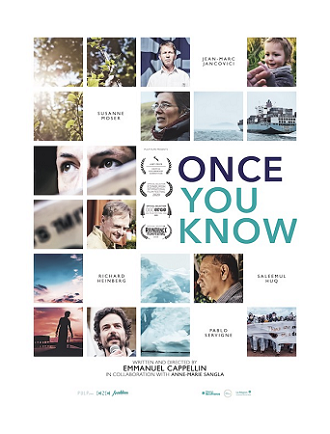
Once You Know 2020
Distributed by The Video Project, 145 - 9th St., Suite 230, San Francisco, CA 94103; 800-475-2638
Produced by Anne-Marie Sangla
Directed by Emmanuel Cappellin
Streaming, 105 mins
High School - General Adult
Environmentalism; Global Warming
Date Entered: 12/07/2021
Reviewed by Kathleen H. Flynn, Science Librarian, University at AlbanyIs it greedy for everyone on Earth to want to live in a decent house, own a car, and have two children? In the film Once You Know, interviewee Richard Heinberg from the Post Carbon Institute marvels at how although this does not seem outrageous, the planet must be destroyed to achieve it. In a 1972 report titled The Limits to Growth, the authors studied economic growth and resource availability. One possible scenario concluded that without changes in consumption, populations and industries would collapse. The director of the film Once You Know was inspired by this report. Although he tried to be environmentally conscious, planted trees, and made films spreading awareness about climate change, he found these actions had no impact.
Many films about climate change seek to raise awareness of the damage being done, either to inspire change or to mourn the future loss of life on Earth. This film takes a different approach and seeks to prepare viewers for how their lives will need to change if they are to adapt to the inevitable collapse of our current way of life. The film features present day examples such as villagers who converted from rice farming to fish farming in Bangladesh, which is already sinking under rising water levels. However, it is noted that one can only adapt so much before they must abandon an area. The director, who lives in a village in France, wonders if he will one day need to migrate with his family due to climate issues. Interviewee Susanne Moser from the Intergovernmental Panel on Climate Change (IPCC) wonders if humans are willing to sacrifice to live like we do during war times. This would also require humans to work together to adapt and live together peacefully.
One point made by the speakers is the injustice of climate change. The richest countries of the world are able to reap all of the economic and societal benefits that heavy industry can bring, but they are not yet experiencing many of the downsides. The poorer countries, especially if they are near sea level, do not gain any of the benefits. However, they already face the consequences of the actions of their richer neighbors. In the film, Saleemul Huq, a climate scientist, expresses his frustration about the Paris Agreement negotiations. He believes the richest countries seemed unwilling to consider paying loss and damages to the poorer countries that are currently suffering the effects of climate change that they did not cause.
The film is well-made and presents a unique perspective about the future with climate change. The film’s message is that it is better to know and accept now that we will need to have limits on our lifestyles in the future. English subtitles are frequent, but legible. The film is highly recommended for courses in environmental studies.
Awards:Terra di Tutti Festival, DamsLab Mention; AFO CZU Film Festival, Grand Prize and Honorary Mention; Earth Day Film Festival, Earth's Choice Award; HKIFF Documentary Competition, Jury Prize; Another Way Film Festival, Audience Award; Tve Global Sustainability Film Awards, Documentary Impact Award; Festival international du film d'éducation d'Evreux, Best Documentary Award
Published and licensed under the Creative Commons Attribution 4.0 license. Anyone can use these reviews, so long as they comply with the terms of the license.